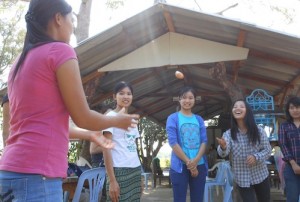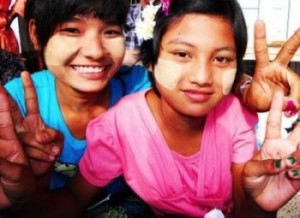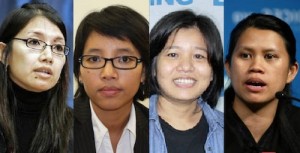Forced to Flee, Women from Burma Now Pressured to Return
Originally appeared in The Best Friend
March 3, 2013 Working outside Burma for positive changes inside is a fundamental and imperative aspect of effective documentation and campaigning. But now, many members of the exile community — including staff of Women’s League of Burma and other women’s organizations — are feeling the pressure to return. Zi Wo reports on how these activists are confronting the push…
Working outside Burma for positive changes inside is a fundamental and imperative aspect of effective documentation and campaigning. But now, many members of the exile community — including staff of Women’s League of Burma and other women’s organizations — are feeling the pressure to return. Zi Wo reports on how these activists are confronting the push…
Saw San Nyreim Thu’s office is in an ordinary double-storey house in Chiang Mai. An overgrown mango tree towers over the metal gate, a cat slinks in between the bars. The house is furnished with some computers and furniture — just enough for the dozen or so staff members to organize peace-building talks between non-state armed groups and the Burmese government, to run political education programs for hundreds of women, and to produce campaign films about crimes against humanity.
Working outside Burma for changes inside is a concept confusing to many, but not so for active members of the exile/diaspora community, such as the staff of Women’s League of Burma (WLB).
“We can be more vocal. We can organize trainings on sensitive topics like constitutional processes and federalism,” explains Saw San Nyreim Thu. Having worked on human rights for 12 years, the 34-year-old joint-general secretary of WLB knows that equitable development and sustainable peace can be achieved only through structural changes using a rights-based approach. She herself has witnessed that the small expansion of advocacy space is still far from sufficient.
Like other WLB staff, mostly refugees who have fled from civil war, political persecution, and economic deprivation, Saw San Nyreim Thu wishes to do her work in her country. She wants to be part of the changes as they happen, and to take care of her ailing 90-year-old father. But to work effectively against human rights abuses, she believes she must stay in border areas.
“Unless there is more political freedom and better infrastructure, I can’t return home.”
Donors also want work to be done in Burma – and they want it now. All the workers from women community-based organizations (CBOs) in Thailand told me that donors have directly or indirectly asked them to relocate to Burma, and to register for legal status. An observer commented that “sympathetic” donors have allowed “one to two years” for this to happen.
Based on recent legislative and political changes, it seems that cross-border groups like WLB and its 13 member organizations (including Karen, Kachin, Lahu, Shan, and other women’s groups) should no longer need to secretly work ‘underground’ inside Burma, but their caution has served them well.
 Burma, deprived of international contact for nearly half a century, is severely handicapped by the lack of transparent and just mechanisms. Repeal of censorship laws and the establishment of a Rule of Law committee do not equate a stable, functioning democratic system that prizes equality.
Burma, deprived of international contact for nearly half a century, is severely handicapped by the lack of transparent and just mechanisms. Repeal of censorship laws and the establishment of a Rule of Law committee do not equate a stable, functioning democratic system that prizes equality.
May Htet Aung, an activist based in Rangoon, noted increased activities related to political and human rights issues. However, the government’s arbitrary treatment of CBOs engaging with such issues has led to self-censorship, and groups that desire to toe the line create yet more amiguity.
Groups that choose to register — if they can afford the prohibitive fees — are conscious of this game. Some humanitarian and development INGOs and donors working in Burma take a “non-confrontational” approach to advocacy in order to operate in the country without difficulties. For example, Nant Thanda Aung’s Karen Women’s Action Group may finally be able to register now that it has changed its name to “Kayin Women’s Empowerment Group”, explaining that Burmans prefer to use ‘Kayin’ over ‘Karen’, and “‘action’ sounded as if the group is ready to fight”.
May Htet Aung added wryly, “Myanmar Egress did a workshop on the constitution — but it was only about how to accept it!” The repressive 2008 constitution remains rejected by most civil society groups. Saw San Nyreim Thu observed that federalism, the top demand of ethnic groups, is also conspicuously missing from discussions and activities in Rangoon.
“‘Don’t come back first’,” Khin Ohmar, a leader of Burmese Women’s Union and current coordinator of Burma Partnership, quoted what in-country CBOs are telling her. “They say, ‘We don’t trust these guys [the government] yet. Until the next elections [in 2015], you guys should stay on the border. Keep on being vocal, because we can’t.’” Knowing their constraints, they dislike and are fearful of being showcased as Burma’s progress, and of being co-opted.
Still, the activists are quick to seize any opportunity they can. Saw San Nyreim Thu led a delegation to Rangoon last December, the first official visit since the group was founded in 1999. They discussed their aim to have a fairer representation of women in the Parliament, peace talks, and civil society.
Pouring funds into a unitary government structure lacking democratic and transparent mechanisms is playing with fire, as experiences in countries such as Cambodia have shown. There is also the danger of legitimizing and strengthening a regime dominated by Burman elites from the former military junta.
United Nations agencies, which have always worked with the consent of the Burmese government, illustrate the downfall of working with formal institutions in Burma. Coordinator at Kachin Women’s Association of Thailand (KWAT) Moon Nay Li recalls a program in Kachin State that was implemented by Burmans from Rangoon and conducted in Burmese, a second language to the local population. She pointed out that there is a wide availability of skilled Kachin people capable of conducting such programs, but local hires were limited to low-level tasks.
Officially working inside comes with many limitations and difficulties that cross-border groups do not experience. For years, the cross-border women’s groups have been able to document human rights abuses in the country, and have been successful in raising awareness of, and solidifying support for, Burma.
Until last year, KWAT was the only group with fulltime field workers documenting rape, torture, and other abuses in Kachin State. Moon Nay Li explained that in-country groups lack experience and knowledge about human rights documentation.
“We initially wanted to focus on women-related abuses only, like sexual violence, but when we found there were no other groups, we knew we had to document everything we saw on the ground.”
The outside groups ensure that their access to wider resources and freedoms benefits those inside by bringing women from disparate areas of Burma together in border areas to participate in empowerment and capacity-building workshops, thereby increasing the political participation of women throughout the country.
Khin Ohmar, surprised by an observer’s wonder at the dynamic civil society now seen in Rangoon, pointed out that the perseverance of the cross-border movement helped create the current space in Burma.
“This is not magic! Not that the border groups can take full credit, but they have been working on capacity-building for a long time.”
The cross-border groups also provide assistance for refugees from Burma, a burden that has increased since aid has been slashed dramatically by major donors such as the Norwegian government since as early as 2012. Even if the groups wanted to, they are unable to ignore the border’s needs to pull out of Thailand. For now, many have decided on having both in-country and cross-border activities.
However, their dedication and prudence has surprisingly been met with aggression. An observer commented that cross-border groups are being called names (“peace spoilers”, “aren’t able to see anything good in what’s happening”) and are being “totally vilified”. Several groups have been accused of trying to ensure their legitimacy and survival by overlooking the positive reforms of President Thein Sein’s nominally-civilian government.
The reality is that staff members of cross-border groups do not enjoy easy lifestyles or bountiful perks. The majority lack legal documentation and risk being harrassed, arrested, or even deported by Thai police at any time. Most have not seen their families in many years. They have no insurance, and similar work in Rangoon reportedly receives twice to thrice the salary compared to that in border areas.
“Nobody intends to keep struggling in neighboring countries for good,” says co-founder of Burmese Women’s Union Mi Sue Pwint. “Most people in exile are undocumented and nobody wants to settle down in such unstable places.”
Khin Ohmar can see why donors wish to work in-country, saying, “I think I can understand. They want to be more effective in their support. But for organizations working on democracy, we have to be strategic and look at the long-term.”
 The desires are clear: CBOs within and without need outspoken advocacy against human rights abuses in the country. To continue building a strong civic society, the authenticity and independence of the CBOs must not be threatened, and the real value of being located on the border must not be overlooked over in search of other pastures.
The desires are clear: CBOs within and without need outspoken advocacy against human rights abuses in the country. To continue building a strong civic society, the authenticity and independence of the CBOs must not be threatened, and the real value of being located on the border must not be overlooked over in search of other pastures.
As activists in Burma explained to Khin Ohmar, “We don’t want to be trapped at a dead end.”
Report by Zi Wo exclusively for The Best Friend. Zi, a Singaporean national, has been volunteering with Burmese women’s groups in Mae Sot and Chiang Mai since 2012. Her photos and stories documenting women’s lives in Burma will be exhibited at Borderline Gallery in Mae Sot in the near future.
View the original article here.
Tags: The Best FriendThis post is in: News Clip
Related PostsU Gambira Re-arrested, Transferred to Insein Prison
Official Statement on 13 January Amnesty
Rally in Chiang Mai draws several prominent ethnic activists, international media
Mandalay Peace Protest – Sangha under pressure
Mandalay Peace Protest – Police have surrounded the monastery









 All posts
All posts